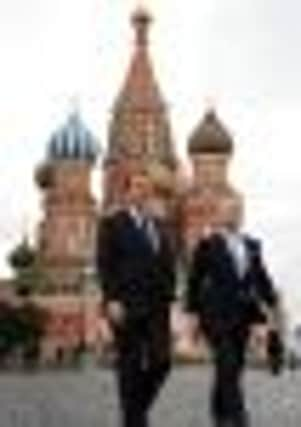Murder won’t stand in way of closer ties with Russia, says Cameron


The continuing impact of the dispute was laid bare when Mr Medvedev insisted yesterday the chief suspect in the dissident’s killing six years ago would never be extradited.
He also said there were questions about the integrity of the UK justice system, and demanded that the Prime Minister respect Russian laws.
Advertisement
Hide AdAdvertisement
Hide AdMeanwhile, Mr Cameron flatly refused a public plea from the president for intelligence co-operation to be restored. The blunt exchange came as the Prime Minister sought to build bridges during the first visit by a British leader to Moscow for six years.
In a joint press conference at the Kremlin, both men sounded an optimistic note about the potential for boosting trade, economic and cultural links between their countries.
During the visit, £215 million of deals have been sealed by the delegation – which includes 24 senior executives from UK firms.
There has also been agreement on a faster visa service for Russian businessmen wanting to travel to the UK.
However, questions about the 2006 radiation poisoning of Mr Litvinenko, which sent relations into the deep freeze, have dominated the Prime Minister’s public appearances.
Mr Cameron made clear that the government was not backing away from its demand that ex-KGB agent Andrei Lugovoy face charges in Britain.
But he said there was a “bilateral agenda for Britain and Russia that needs to be progressed, and should be progressed”.
He denied that he was sacrificing principles in order to get relations back on track.
Advertisement
Hide AdAdvertisement
Hide Ad“It’s not parking an issue, just recognising there’s a disagreement, that hasn’t changed … We should work on our relationship beyond it.”
But Mr Medvedev reiterated Russia’s position that extraditing Mr Lugovoy – now a member of the country’s parliament – was impossible under the constitution. “We all have to learn to respect our legal frameworks,” he said through an interpreter. “That will never happen no matter what will be the circumstances.”
He added: “We have many questions about how the legal questions are being resolved in the UK.”
Mr Medvedev said Sunday’s anniversary of the 11 September attacks emphasised the need for co-operation to tackle terrorism.
“In this regard I believe that there is a need to reconstitute the contacts not only between the law enforcement agencies but between the special services,” he said. But Mr Cameron responded: “We haven’t changed the arrangements between our security services, which were frozen after the Litvinenko issue. That is not being discussed as something that is going to change.
“But I think that we can talk about how we co-operate in terms of combating criminality, and how our police services, our serious and organised crime [agencies] work together in the future.”